MOUNT JULIET, Tennessee — At the Wilson County Conservative Republicans meeting Saturday, guest speaker Rep. Judd Matheny (R-Tullahoma) said of the battle over the 2018 state budget, “If everybody does stand together, government has to come down to our level.”
Matheny was referring to the stand-off that occurred in the House of Representatives when he added a constitution-breaking amendment to the budget, which prompted House Speaker Beth Harwell (R-Nashville) to come down on the House floor and sit next to Matheny in Rep. Mark Pody’s (R-Lebanon) adjacent empty seat. Alluding to Pody’s absence that day preaching the eulogy at a funeral, “The seat was empty next to me, and believe me, I felt it,” said Matheny.
The monthly meeting, according to host Sen. Mae Beavers (R-Mt. Juliet), started seven to eight years ago and was attended this month by a crowd of about 40 overflowing the room at the Providence location of Logan’s Roadhouse in Mt. Juliet.
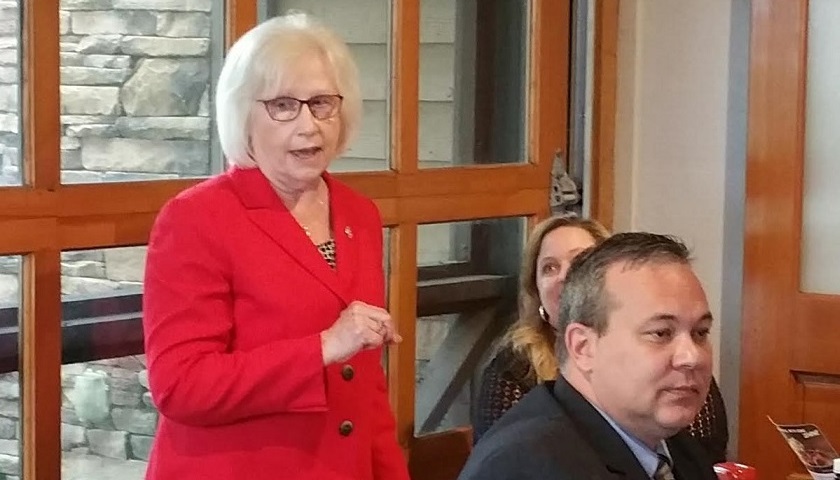
Pody introduced Matheny at the Saturday meeting, saying that sitting next to Judd Matheny was the only request he has ever made of Speaker Harwell when he came to the House and she asked what Pody wanted for a wide range of things including parking spaces, office space and an assistant. About making that single request, Pody said, “I want to sit next to somebody that I know and trust and will make sure that I’m going to vote the way I need to.”
The two sit as a peninsula of conservativism among Democrats on the three sides of their desks.
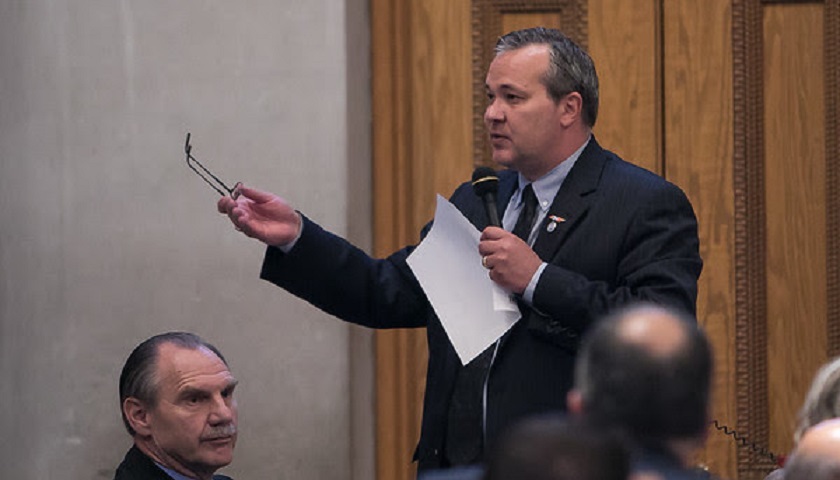
With obvious respect, Pody concluded his introduction of Matheny by saying, “This is a patriot. This is somebody I trust. This is somebody who can be doing so much more. He’s going to be somebody to be watching. With that, my dear friend, Judd Matheny.”
Matheny first recognized Sen. Beavers and Rep. Pody as two who “live up to the Republican platform” and are “never going to change.”
Then, Matheny put the state of the state in perspective, “First of all, I want to start off by saying that you’re extremely fortunate to live in Tennessee. We all are. You have the lowest capita debt of any citizen in the country. You also have the highest per capita surplus of any citizen in the country. Those are two just extraordinary things.”
The attendees listened intently as the well-established conservative House leader gave the background on the budget fight, “I could just stand up here and give a completely righteous speech, but part of my job is to fix the bad stuff.”
And we do have bad things. We have all this money coming in. There’s a reason all this money came in. We’re over taxing our citizens and we’re over taxing our businesses. So instead of trying to spend all of that plus ask for more, we as conservative Republicans from the very beginning thought why don’t we take these surpluses we’re generating because of our geographic location and the business practices, in particular the tax cuts that we put in place the last five years and let’s put that money back into the citizenry, let’s put it back into infrastructure let’s build local projects with that money to suppress the need for local property tax increases or wheel tax increases or other local government increases.
Whereas the state portion of Governor Haslam’s 2017-18 budget is growing $1.5 billion over the previous year, from $16.4 to $17.9 billion, Matheny said that growth should be limited to $350 to $400 million.
And putting the state government’s growth into perspective, “The rate of growth of our government is roughly twice the rate of growth of you as a person as an individual, even in this great economy.”
That growth of the state’s government in excess of personal income growth required the General Assembly to vote to break the Copeland Cap, a 1978 amendment to Tennessee’s constitution named for its author, former state Representative David Copeland. The constitutional amendment states that “In no year shall the rate of growth of appropriations from state tax revenues exceed the estimated rate of growth of the state’s economy as determined by law.” By simple majority, the General Assembly can vote to override the cap, which they did on May 5 in the House and May 8 in the Senate.
About that growth, Matheny cautioned, “That puts us on a very dangerous trajectory.” He continued,
In the 16 years I’ve been up here, I’ve seen it go both ways. I’ve seen it when we had recessions, and when we didn’t have a terrible recession, but we had a budgetary recession because of Medicaid expansion, and that was Tenncare.
So even if we were making money as a state, we were hemorrhaging as policy.
The rainy day fund, our incomes, our expenditures and our commitments have always been within $350 to $400 million of each other. Now we’re starting to get to within a couple billion dollars of each other.
So, the next time we have a major recession, if we continue at the rate of growth of government, it’s going to be a devastating issue to try to correct, instead of one we can actually do with the reserves that we have and tinker around the edges a little bit on the budget.
So that’s one thing as conservative republicans, we thought, we need to get out in front of that.
The strategy was not cutting a deal, “We cut no deal, I don’t care what the media told you, but we cut no deal with the Democrats.” But, rather, “We put an amendment on the budget which put it out of line constitutionally and out of balance with the Senate and sent us to the negotiating table.”
That amendment would have taken $300 million out of the growth of government and distributed it to the school districts, according to the existing per capita BEP (Basic Education Program) formula. That funding, which would have amounted to $2 to $4 million per school district, would be designated for paying directly down capital debt for school projects.
That’s when Speaker Harwell made her desk-side appeal to Rep. Matheny to let the normal budget process continue. His refusal forced a negotiation process which yielded $55 million to go to the locals in one-time money for road projects.
Matheny explained that for the conservatives, it was never about funding transportation.
We don’t want to disagree and we don’t disagree with the Governor on the transportation initiatives. We all know that transportation is one of the main reasons we enjoy budget surpluses.
If I’m not mistaken, there’s 12 interstate systems that come through or connect in the state of Tennessee. All three of our grand divisions have interstate routes. Best place in the world to manufacture and transport from and store tractor trailers and all those kinds of things.
So, transportation’s been a great asset to us. Those surpluses we have are in large part to transportation and geographic location. So, let’s put those back into transportation and let’s not disagree with TDOT or the Governor’s transportation initiative, but let’s disagree with the way to fund it.
How can we as conservative Republicans in a record tax surplus history when we also have near record surpluses in every single department and rainy day fund, how can we stand up and ask you, the taxpayer, for more taxes.
Matheny said about getting the over collection of taxes back in the hands of taxpayers, “It would be very difficult to write a check back to each one of you.”
As such, the $55 million strategically negotiated by the conservatives, achieves the next best thing, “We’ve got to send the money back to the locals. As the locals, we are the ones that pay. The state didn’t generate the tax money.”
In addition to the $55 million one-time allocation to locals from the budget debate, the conservative fight on the IMPROVE Act also yielded the reduction in the gas and diesel taxes from 7 and 12 cents per gallon to 6 and 10 cents per gallon, respectively, phased in over three years; the elimination of the fuel tax indexing; and increase in the food sales tax reduction from half to one percent.
Summarizing the long-term view of conservatives, Matheny concluded, “Our job, as legislators, is to identify these strategic problems that we know that for the next generation are going to be very dangerous. Not only with your freedoms and liberties, but also finances. We are trying to fix them now, but surrounded by another group of people who only think in two to four year terms. To sit in the middle of that, think strategically, build policy and financial strategy is very difficult. Then you’ve got the urban versus rural component on top of it. So, it’s a real challenge.”

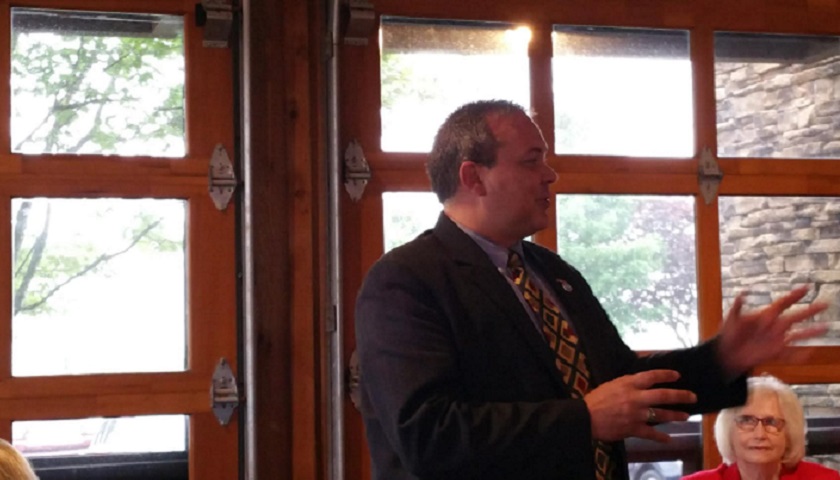


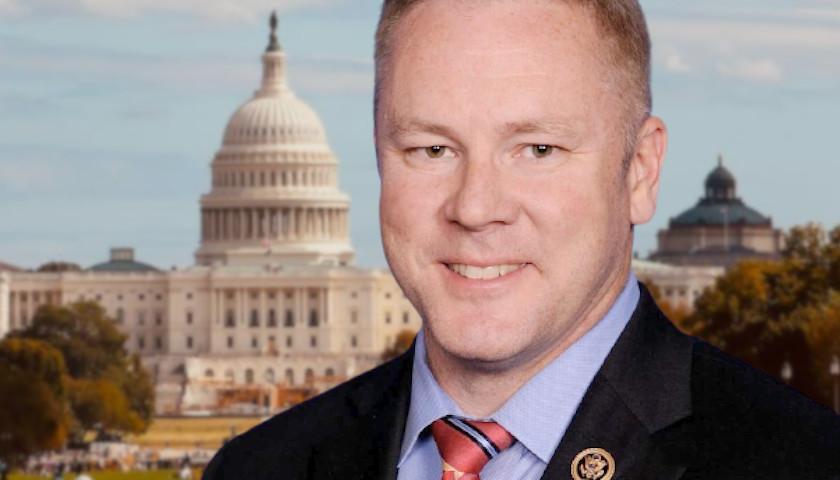
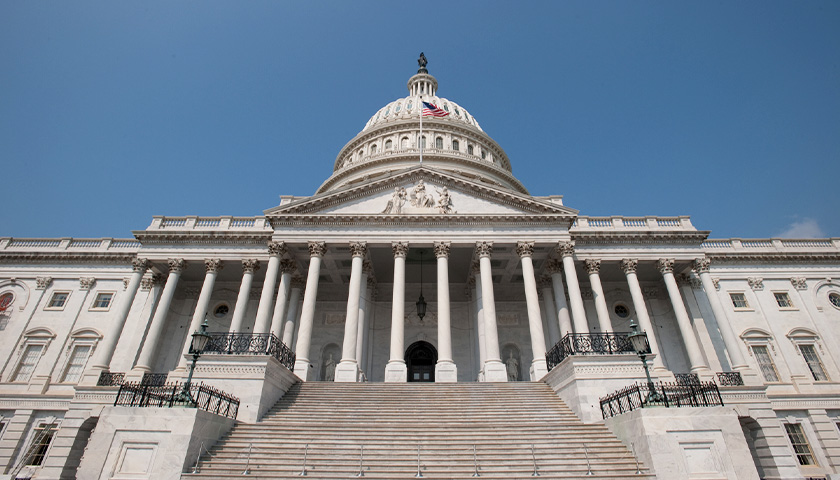
[…] evening, after hosting the monthly Wilson County Conservative Republicans meeting and attending a Memorial Day service at The Stone Church in Alexandria, Sen. Beavers issued a press […]